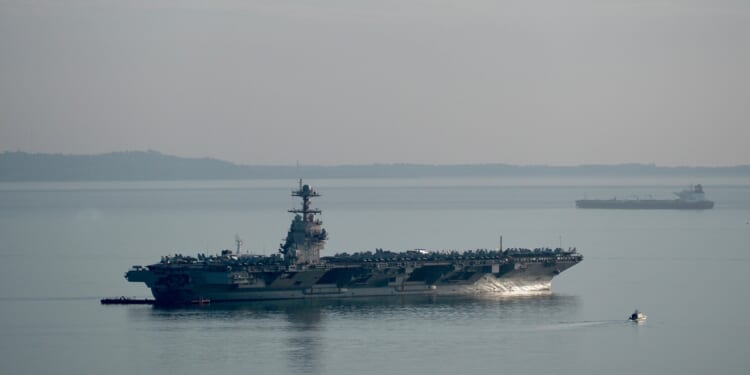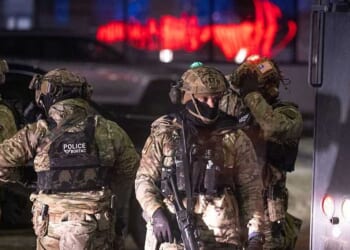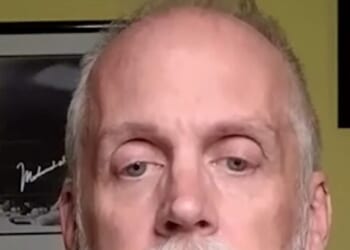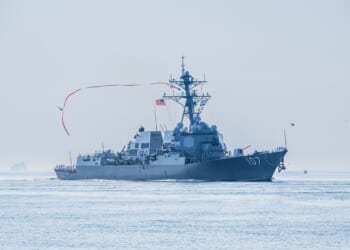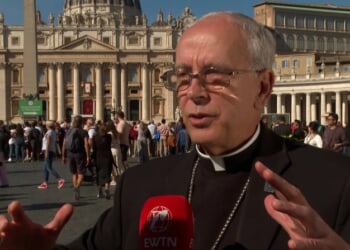The USS Gerald R. Ford was recently redeployed to the Caribbean—nominally as part of a drug interdiction mission, but realistically to intimidate the Maduro government in Venezuela.
The United States Navy confirmed on Tuesday that the USS Gerald R. Ford (CVN-78), the world’s largest aircraft carrier, had arrived in the Caribbean. The nuclear-powered carrier had been operating in the Mediterranean Sea, where it had initially been deployed to ensure the fragile peace in Gaza would hold. Earlier this month, however, Secretary of Defense Pete Hegseth ordered the Gerald R. Ford Carrier Strike Group (CSG) to support the ongoing efforts to “dismantle Transnational Criminal Organizations and counter narco-terrorism in defense of the Homeland.”
The deployment of the newest, largest, and arguably most capable nuclear-powered supercarrier in service is part of a massive buildup of US military assets in the US Southern Command area of responsibility (USSOUTHCOM AOR).
The Ford’s Carrier Strike Group Should Alarm Venezuela
CVN-78 has arrived in the Caribbean with nine embarked squadrons of Carrier Air Wing Eight (CVW-8), operating F/A-18E/F Super Hornet multirole fighters, E/A-18G Growler electronic warfare (EW) aircraft, and E-2D Advanced Hawkeye airborne command and control planes, among other assets. The CSG also includes Destroyer Squadron Two’s Arleigh Burke-class Aegis guided-missile destroyers USS Bainbridge (DDG 96) and USS Mahan (DDG 72), which can provide anti-air, anti-submarine, and anti-surface capabilities; and the integrated air and missile defense command ship USS Winston S. Churchill (DDG 81), which the Navy said will lead the “strike group’s air and ballistic-missile defense.”
The build-up comes as the US has carried out strikes against at least 19 boats in the Caribbean and the eastern Pacific that were purported to be smuggling illegal narcotics to the United States. At least 76 people have been killed in the attacks. The CSG will further increase the US forces to continue to counter the attacks at sea, but could also signal that Washington may carry out strikes on land targets in Venezuela, which President Donald Trump has accused of allowing the flow of narcotics into the United States.
“The enhanced US force presence in the USSOUTHCOM AOR will bolster US capacity to detect, monitor, and disrupt illicit actors and activities that compromise the safety and prosperity of the United States homeland and our security in the Western Hemisphere,” said Chief Pentagon Spokesperson Sean Parnell. “These forces will enhance and augment existing capabilities to disrupt narcotics trafficking and degrade and dismantle Transnational Criminal Organizations.”
Understanding the Showdown in South America
In response to the carrier’s arrival in the region, Venezuela ordered a massive mobilization of its forces, The Washington Post first reported. Venezuelan President Nicolas Maduro repeatedly accused the United States of “fabricating” the ongoing crisis in an effort to topple his government.
The United States, along with Canada, the European Union, and the majority of Latin American nations, does not recognize Maduro’s legitimacy. It considers the 2018 and 2024 elections that kept him in power to be fraudulent, citing blatant voting irregularities, repression of the opposition, and a lack of transparency. Conversely, Maduro is recognized as the legitimate president by the governments of Russia, China, Iran, Cuba, and Nicaragua. He was sworn into a third six-year term in January.
Tensions have also remained high with neighboring Colombia. Although that country was designated a Major Non-NATO Ally under the Biden administration, US-Colombian relations have been strained throughout the second Trump administration due to political differences between Trump’s right-wing administration and Colombian leader Gustavo Petro’s left-wing one. After Petro publicly criticized Trump during a visit to the United States for the United Nations General Assembly in September, the Trump administration revoked his visa, forcing him to return home early.
Trump recently lambasted Petro as “a thug and a bad guy.” On Tuesday, Petro responded by suspending intelligence cooperation with the United States.
About the Author: Peter Suciu
Peter Suciu has contributed over 3,200 published pieces to more than four dozen magazines and websites over a 30-year career in journalism. He regularly writes about military hardware, firearms history, cybersecurity, politics, and international affairs. Peter is also a contributing writer for Forbes and Clearance Jobs. He is based in Michigan. You can follow him on Twitter: @PeterSuciu. You can email the author: [email protected].
Image: Shutterstock / SimoPitt.

